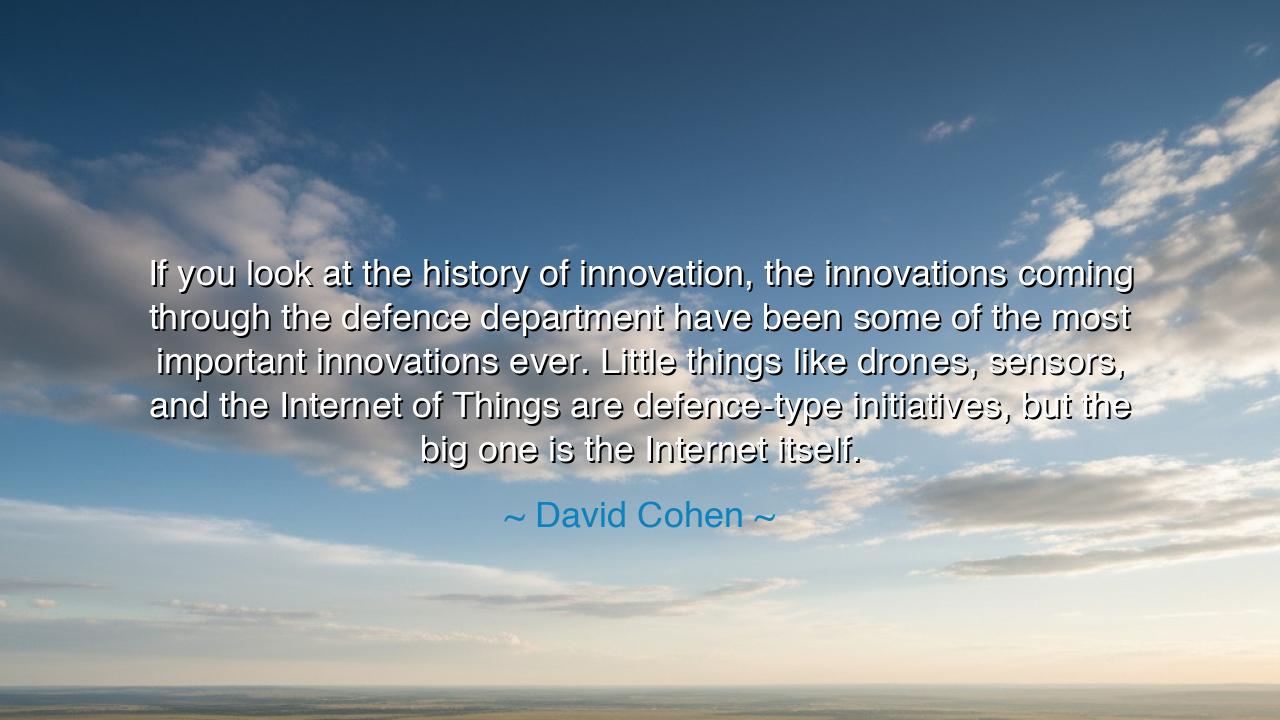
If you look at the history of innovation, the innovations coming
If you look at the history of innovation, the innovations coming through the defence department have been some of the most important innovations ever. Little things like drones, sensors, and the Internet of Things are defence-type initiatives, but the big one is the Internet itself.






In the words of David Cohen, visionary of technology and industry, there is revealed a truth about the strange marriage of necessity and invention: “If you look at the history of innovation, the innovations coming through the defence department have been some of the most important innovations ever. Little things like drones, sensors, and the Internet of Things are defence-type initiatives, but the big one is the Internet itself.” Though he speaks of machines and circuits, his words are not merely technical — they are philosophical, echoing an ancient truth: that from struggle, creation is born; from danger, discovery emerges. For in the crucible of defence, humanity often finds the spark that ignites its greatest innovations.
The origin of this wisdom lies in the nature of survival itself. Since the dawn of civilization, fear and necessity have been twin midwives to invention. When the ancient tribes faced hunger, they forged tools; when kingdoms faced invasion, they raised walls, built ships, and discovered metals. War and conflict, tragic as they are, have always pressed the human spirit toward advancement. What Cohen observes in the modern defence department is but a continuation of that same cycle — the eternal rhythm of human ingenuity responding to crisis. The spear became the sword, the sword the cannon, the cannon the rocket — and in time, even the rocket gave rise to satellites and the Internet.
Consider the story of ARPANET, the seed from which the Internet grew. In the 1960s, during the height of the Cold War, the United States sought a way for its military to communicate securely, even if cities were destroyed by nuclear strike. Out of this fear was born a network — small at first, connecting only a few research universities — but destined to become the web that now binds the world. What began as an act of defence became an act of connection. From the shadow of war rose the light of knowledge and global unity. So it has often been: the tools forged for protection become the bridges that link humanity.
Cohen speaks too of drones, sensors, and the Internet of Things — the offspring of military precision now repurposed for peace. The eye that once scouted battlefields now monitors crops and rescues lost hikers; the sensors that once detected enemies now detect disease. The same spirit that armed the soldier now empowers the scientist and the healer. Thus, even in humanity’s darkest endeavours, there resides the potential for light — for invention, once freed from fear, becomes service.
Yet, the wise must not mistake this for justification of conflict. The ancients taught that wisdom is to draw light from darkness without worshipping the darkness itself. The fact that war has birthed invention does not make war noble; it makes transformation necessary. The glory lies not in the sword, but in the ploughshare forged from it. True greatness, Cohen reminds us, is not in the defence of life alone, but in the elevation of it. To take what was once used for destruction and turn it into creation — that is the triumph of human progress.
This truth has echoed through the centuries. The Romans built roads for their legions — and left behind the arteries of civilization. The space race, born of rivalry, gave humanity new eyes to see the cosmos and new tools to heal the earth. Each time, the motive was survival, but the result was transcendence. Thus, Cohen’s words stand as both observation and challenge: that even the harshest engines of innovation must ultimately serve the greater good — not the preservation of power, but the expansion of understanding.
Therefore, O seeker of knowledge, take this lesson to heart: do not despise the forces of necessity that drive you; instead, learn to transform them. When you face hardship, remember that adversity is the forge of innovation. When fear tightens its grip, let imagination loosen it. Seek always to turn defence into creation, survival into wisdom. For the true purpose of technology is not to destroy, but to connect, not to dominate, but to uplift.
And so, as David Cohen reminds us, the greatest innovations — from the Internet to the smallest sensor — were born not from comfort, but from courage. Let us then use these gifts not to repeat the past, but to redeem it. Let every mind that invents remember the sacred duty of invention: to transform the tools of war into instruments of peace, and to ensure that every act of innovation serves not fear, but the flourishing of all humankind.






AAdministratorAdministrator
Welcome, honored guests. Please leave a comment, we will respond soon